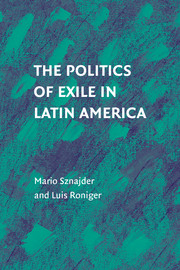Book contents
- Frontmatter
- Contents
- Acknowledgments
- List of Acronyms
- Introduction: The Politics of Exile
- 1 Defining the Exilic Condition
- 2 Forceful Displacement, the Construction of Collective Identities, and State Formation
- 3 The Format of Early Exile
- 4 Sites of Exile
- 5 Widening Exclusion and the Four-Tiered Structure of Exile
- 6 Exile Communities, Activism, and Politics
- 7 Presidents in Exile
- 8 Is Return the End of Exile?
- Bibliography
- Index
- References
6 - Exile Communities, Activism, and Politics
Published online by Cambridge University Press: 28 July 2009
- Frontmatter
- Contents
- Acknowledgments
- List of Acronyms
- Introduction: The Politics of Exile
- 1 Defining the Exilic Condition
- 2 Forceful Displacement, the Construction of Collective Identities, and State Formation
- 3 The Format of Early Exile
- 4 Sites of Exile
- 5 Widening Exclusion and the Four-Tiered Structure of Exile
- 6 Exile Communities, Activism, and Politics
- 7 Presidents in Exile
- 8 Is Return the End of Exile?
- Bibliography
- Index
- References
Summary
In this chapter, we trace the strategies and dynamics of exile communities, analyzing the plurality of collective experiences by focusing on the most recent waves of exile. As thousands of individuals moved abroad to escape political persecution between the 1960s and the 1980s, communities of exiles developed throughout the Americas, Europe, and as far away as Australia, Asia, and Africa. Although in some places only minor concentrations found asylum, other locations attracted thousands of co-nationals, among them political exiles, turning from mere lieux d'exil into milieux d'exil, which in turn would attract new waves of politically persecuted individuals and groups.
Often, political exiles are but a minor part of the entire community of co-nationals in a certain host country and of diaspora politics. However, communities of Latin-American migrants, students, and sojourners were often politically activated and radicalized by incoming exiles. Under conditions of mobilization of the host country's public opinion and new connections with international organizations and transnational social–political spaces and networks of solidarity, the presence of exiles often constituted a catalyst for the formation of an image of an influential community of exiles.
Communities of Exiles
There is immense variance in this regard across communities of exiles, which can be analyzed through two key elements; namely, the degree of politicization and political activism of the exiles, and their capacity to become the core vectors of a community of translocated co-nationals through their ability to organize the newcomers and represent them as exiles vis-à-vis local, national, and international organizations and networks.
- Type
- Chapter
- Information
- The Politics of Exile in Latin America , pp. 193 - 256Publisher: Cambridge University PressPrint publication year: 2009



